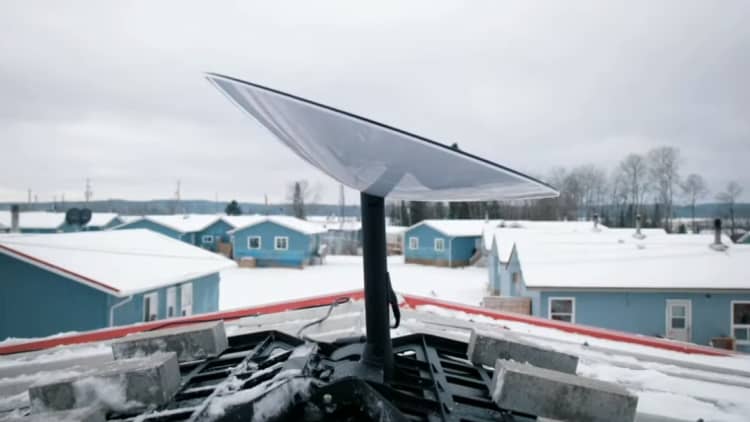Elon Musk on Tuesday said SpaceX's satellite internet network Starlink "recently" passed near 70,000 active users and expects fast-paced growth in the year ahead.
"We are on our way to having a few hundred thousand users, possibly over 500,000 users within 12 months," Musk said, speaking virtually at the Mobile World Congress trade show in Barcelona, Spain.
Starlink is the company's capital-intensive project to build an interconnected internet network with thousands of satellites, known in the space industry as a constellation, designed to deliver high-speed internet to consumers anywhere on the planet. SpaceX first rolled out the service with a beta program for select consumers for $99 a month, and in the past year has sought regulatory approval to test the network inflight and expand the service to large moving vehicles, like ships and trucks.
It's now the world's largest satellite constellation, with more than 1,500 Starlink satellites launched to orbit to date.
SpaceX last month touted that Starlink has received more than 500,000 orders and deposits so far to date, although those may not materialize into users. Starlink's user base has grown, from about 10,000 users in February to Musk saying that this month it passed "the strategically notable number of 69,420 active users."

The low altitude of SpaceX's satellites decreases the latency in its service compared to traditional satellite services, which Musk emphasized. Latency is the amount of delay in an internet network, defining how much time it takes a signal to travel back and forth from a destination. Latency and download speeds are key measures for an internet service provider.
"The latency for the Starlink system is similar to latency for ground-based fiber and 5G, so we're expecting to get latency down under 20 milliseconds," Musk said.
The company is "losing money" on the satellite antennas that it provides to customers, Musk said, as the hardware costs near $1,300 each but SpaceX charges users $499.
"We're working on a next generation terminal that provides the same level of capability, roughly same level capability, but costs a lot less," Musk said.
As company leadership has previously stated, Musk estimated Starlink may cost SpaceX between $5 billion and $10 billion to become fully operational and then as much as $20 billion to $30 billion in investment over the long term. But SpaceX believes it can tap an even larger market, estimating Starlink could bring in as much as $30 billion a year – or about 10 times the annual revenue of its rocket launching business.
Starlink is "operational now in about 12 countries, and more are being added every month," Musk noted.
"We have two quite significant partnerships with major country [telecommunications companies], that I'd like to be able to announce now but obviously we defer to our partners to make any announcement," Musk said. "And we are in discussions with a number of other [telecommunications companies] to provide Starlink access."
Musk also said SpaceX is getting closer to launching next-generation versions of its Starlink satellites.
"We're getting close to launching satellite 1.5, which has laser inter-satellite links, and that'll be used especially for continuous connectivity over the Arctic and Antarctic regions," Musk said. "Next year we'll start launching version two of our satellite, which will be significantly more capable."
Become a smarter investor with CNBC Pro.
Get stock picks, analyst calls, exclusive interviews and access to CNBC TV.
Sign up to start a free trial today.


